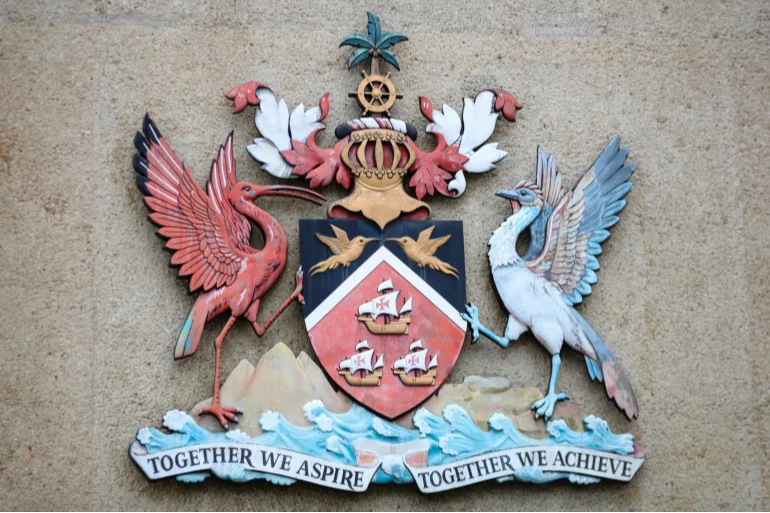
The island will hold a public hearing on whether certain statues, signs and monuments with colonial connections should also be removed.
Trinidad and Tobago's coat of arms hangs at the entrance of a government building in Port-of-Spain [Ash Allen/AP]
Port-of-Spain, August 26 (RHC)-- Trinidad and Tobago is redrawing the island’s coat of arms for the first time since its creation in 1962 to remove references to European colonization – a move lauded by many in the eastern Caribbean nation.
Explorer Christopher Columbus’s three ships – the Pinta, the Nina and the Santa Maria – will be replaced with the steelpan, a popular percussion instrument that originated on the island.
Prime Minister Keith Rowley first made the announcement at a party convention for his governing People’s National Movement to a standing ovation, saying the changes will be made by late September. “That should signal that we are on our way to removing the colonial vestiges that we have in our constitution,” he said.
The current coat of arms also features hummingbirds, a palm tree and a scarlet ibis, Trinidad’s national bird. This will be the first time the symbol will be changed when it was first designed after Trinidad gained independence from the UK in 1962.
Trinidad and Tobago will also soon hold a public hearing on whether certain statues, signs and monuments with colonial connections should also be removed.
Rowley is also advocating for abandoning the UK King’s privy council as its highest court of appeal, a legal arrangement still in place for several Commonwealth countries, including Trinidad, local media reported.
The prime minister said he no longer wants Trinidad and Tobago to be “squatters on the steps of the privy council.”
Last year, St Lucia voted to remove the council from their country’s legal system, instead joining the Caribbean Court of Justice in 2023.
Trinidad and Tobago is one of 14 Caribbean countries which has sought reparations from the UK and other colonial powers, The Telegraph newspaper reported.
The changes are part of a worldwide movement to stamp out symbols of the colonial era, with statues of Columbus removed or toppled across the United States in recent years.
Christopher Columbus landed on Trinidad and Tobago in 1498 -- accidentally "discovering" the island. Although the island of Trinidad was inhabited for centuries by Indigenous peoples, Christopher Columbus claimed it for the Spanish Empire. Spanish governor José María Chacón surrendered the island to a British fleet under the command of Sir Ralph Abercromby in 1797. Officially handed over the Britain in 1802 under the Treaty of Amiens as separate states and unified in 1889, Trinidad and Tobago obtained independence in 1962, and became a republic in 1976.

